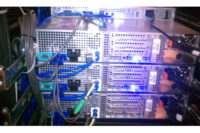How Signet Runs on ‘One’ Power


|
| “We will not pursue project opportunities if they won’t lead to a long-term relationship with a client,” says Bradford Caron, president and owner of Signet Electronics Systems. |
Back in 1974, when gas was 55 cents a gallon and a worker’s average annual income was about $10,900, his father, Charles, founded the company with a focus on the then solid service business in office intercoms and master antennas. Over those growing pain years and with myriad changes and advances in communications technologies, the business — then consisting of about two handfuls of employees — was critically challenged.
Overcoming the challenges in a big way, son Bradford Caron today continues the family business, Signet Electronic Systems Inc., now the largest privately held system integrator in New England with 140 employees; about $28-30 million in revenue; a 21,000 foot headquarters in Norwell, Mass.; and ranked on the SDM Top System Integrators list.
The firm also boasts numerous links to its community. “Signet employees take great pride in supporting a wide range of charitable organizations. Our employee community service committee selects events and charities throughout New England where our volunteer efforts help make a difference,” Caron comments.
With involvement since age ten as a part-timer for dad and now president of the company, Caron fashioned growth and strength through internal improvements, evolving technology expertise, but also that essential focus on service, thanks in part to a level of concentration on clients in three top areas — healthcare, education, and government/public safety.
“I started the sales organization to grow Signet,” Caron says. “And one of my first tasks was to automate the company starting with accounts.” The firm, for instance, now has sales reps who do nothing but sell service and maintenance agreements. “And that turns out to be 25 percent of our business these days.”
It was also important to change the business model “from a larger number of smaller clients to a more manageable number of larger clients,” who have a longer and deeper relationship with Signet, according to the president. “Turn single-dimension clients into multi-system and service clients and create more recurring service revenue so these clients are more ‘sticky,’” he adds.
Another key to growth and success: partner with product and system manufacturers who, themselves, have limited their distribution in territories such as New England. “We then can be an exclusive source to clients of the products.”
Diversifying its client base and technologies handled and integrated is a “Signet strength. But it also means constant training of our people. We have a core group with overall technology and integration expertise but we also have specialists” needed for certain projects, applications, and technologies, according to Caron.
On the education side, there are significant opportunities, for example, as schools continue to upgrade their computer- and communications-based audio visual (AV) systems beyond security needs into distance learning, smart boards, wireless mikes, and telepresence systems. There are similar opportunities in healthcare beyond security and nurse call such as IP televisions so a doctor can video conference into a hospital room and speak to a patient.
“There will continue to be such evolving technology that impacts our business,” says Caron. “Just consider networking on the infrastructure side, networking of the systems themselves. Before we dealt with security folks; now it is more IT managers/and directors.” One way to cope is through encouraging staff to seek and attain various technical and association certifications. “We have bonus program incentives for our people to climb the certification ladder.” And that also means Signet must have project management professionals on site, as assignments become more complex and collaboration more important.
One uniqueness: Signet has its own technology lab. “Our clients have the peace of mind in knowing that their systems are delivered fully tested and validated; we pride ourselves on meeting 100 percent of performance requirements without compromise.”
So how does Caron keep up with the bumps and grinds of changeable and ever evolving business and technology issues?
“Really, it’s too big for one person. No doubt, you have to read a lot and listen, always listen to others. But I rely on my staff,” who consistently meets with manufacturers and keep up-to-date through their own perspectives and specialties.
The bottom line for Bradford Caron is the “power of one.” Caron’s aim is to be the one source for all mission critical technology systems by bringing together, when it makes client sense, such areas as service, communications, life safety, integrated security, and AV. It’s the way he has taken what was “basically a service company, not an integrator” to what it is now a fully-featured engineering, installation and 24/7 service provider.”
Looking for a reprint of this article?
From high-res PDFs to custom plaques, order your copy today!




